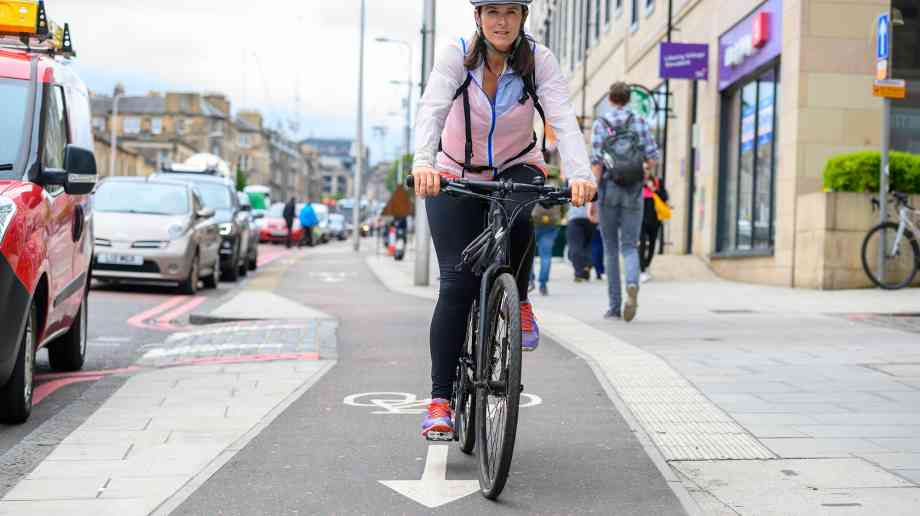Sue Robb of 4Children talks to Julie Laughton and Alison Britton from the Department for Education about the role of childminders in delivering the 30 hours free entitlement.
Public want reduced car use and increased cycling

As cities across the country increase action to meet climate targets, the new Sustran’s Bike Life report shows public support to reduce car use and make it easier for people to cycle.
The Bike Life report, published by the charity Sustrans and 12 major cities and urban areas, reveals that 55 per cent of residents agreed with the statement that there are too many people driving in their area, with a slightly higher percentage (58 per cent) supporting more investment in cycling, compared to 42 per cent for driving.
Additionally, 59 per cent of residents agree that restricting through-traffic on local residential streets would make their area a better place to live and work. A further 56 per cent support the idea of charging more polluting vehicles (including private cars) entering city centres if the financial proceeds were used to help fund public transport, walking and cycling services.
The report highlights cycling as one of the best ways to reduce transport emissions in cities and calls for a step-change in investment for zero-emission modes of transport, such as walking and cycling for everyday journeys. The report also revealed that cycling trips across the 12 cities saved up to 160,000 tonnes of greenhouse gas emissions last year, as well as taking 270,000 cars off UK roads each day.
Three-quarters of respondents think more cycle tracks physically separated from traffic and pedestrians would help them to start cycling or cycle more, while 68 per cent of respondents support building cycle tracks, even when this would mean less room for other road traffic.
Across 11 of the cities and urban areas, there are currently only 50 miles of protected cycle tracks serving a total population of nine million. In comparison, Copenhagen, with its population of 1.3 million, boasts 237 miles of cycle tracks.
Daisy Narayanan, director of Urbanism at Sustrans, said: “The climate crisis is the greatest environmental and health challenge of the 21st century. With road transport being one of the major sources of greenhouse gasses and air pollutants, it’s time we end car-centric planning which has shaped our cities and towns for decades and reprioritise our streets towards people.
“Many cities are taking action to reduce car trips and make it more convenient for people to walk and cycle. Our report shows the public is supportive of these plans. Ahead of crucial climate talks at COP26 in Glasgow, we urge the UK government to show leadership and make a step-change in investment for cycling and walking, including protected cycle lanes, and adopt policies to support more people to switch from driving to walking and cycling for shorter journeys.
"This will help cities and towns to reduce car use and meet the national obligations under the Climate Change Act.”
Chris Boardman, walking and cycling commissioner for Greater Manchester, commented on the report: “The main thing holding people back is the lack of safe, attractive space to cycle, which is why we designed a 1,800-mile cycling and walking network to span Greater Manchester and connect every community. The benefits from enabling people to leave the car at home are potentially enormous but we can’t deliver the country’s biggest urban cycling and walking network without the government’s backing.
“Last month, we took our detailed plan to government and asked them for the sustained investment required to fully deliver this transformational project so we can reap the huge benefits in health, congestion reduction and improved air quality. It’s an investment that will save the region billions. I think the real question, is not whether the government will back us, but can they afford not to? We're currently awaiting their response."
Rachel White, head of Public Affairs at Sustrans, has written an article for Government Business about the socio-economic gap in urban cycling, as well as cities’ actions to reduce car use and traffic emissions. Read it here.
Company Focus
Located in Bromley, Japanese Knotweed Eradication Ltd has been providing solutions in the treatment and removal of Japanese Knotweed (Fallopia Japonica) for over a decade. During this time we have mastered a repertoire of methods, from herbicidal treatments to landscaping solutions, tailored to address the unique challenges our clients face with this pervasive weed.
Event Diary
UKREiiF has quickly become a must-attend in the industry calendar for Government departments and local authorities.
The multi-award-winning UK Construction Week (UKCW), is the UK’s biggest trade event for the built environment that connects the whole supply chain to be the catalyst for growth and positive change in the industry.
Supplier Profiles
Geo Energy
At GeoEnergy Design, we're on a mission to disrupt the traditional way heating and cooling ha
Latest Features
Professor Harith Alani, director of the Knowledge Management Institute at the Open University explains how AI can be used for good and bad.
Alex Lawrence, head of health & social care, techUK sets out techUK’s Five Point Plan for CareTech.

















